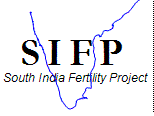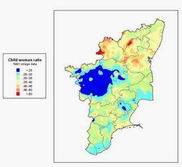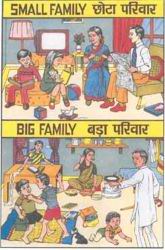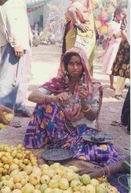 |
||||||||||
|
a project on fertility transition in South India |
||||||||||
| The project | ||||||||||
|
||||||||||
| The Team | ||||||||||
| Output | ||||||||||
|
|
||||||||||
 |
 |
 |
 |
| South
India Fertility Project
|
|
phase
2: highlights
|
Highlights
Reports from Phase 2 include a large variety of fieldwork materials that cannot be summed up here adequately.
Let us just offer a list of topics or quotes from this field notes that might be interesting to other researchers. The list that follows described briefly a given feature observed in one of our research sites with the name of the corresponding state in the right column (please search the relevant reports for the corresponding materials).
"A school in Kannada medium is useless to us Muslims " A village where a dynamic Linguayat swamy has entirely changed the social dynamics A village with an Internet booth to communicate with migrants Affluence doesn't mean change in lifestyle among Muslim women Anti-viagra: to reduce sexual urge among married men Before we had 10 children in the hope that 2 would survive Better to have many uneducated migrants than a few jobless degree-holders Boys = dowry + migrants' remittances "Are children god's gift?- you must be kidding!" "Even if we were richer, we would have 2 or 1, no more!" "if [population growth] continues, we won't have room to stand in this country" "If they have only one girl, they'd better start putting money in the bank [for her dowry]" "In those days, we had to cross a bear-infested forest to go the town" 20 schools and 17 anganwadis 6 different newspapers are read here according to political leanings or community Caste A can't attend the school located in the Caste B area Christians used traditional contraceptive methods before the family planning campaigns Dalits get special tumblers at the teashop Demand for English medium schools in a strictly agricultural village Dominant castes have reduced their fertility earlier than other groups "Methods other than sterilization are for the collector's wife, but not for us" "More than two children is waste" Even the catholic priest advised them to reduce our offspring Family planning was introduced here no less than 40 years ago Fear of Family planning as a reason for high fertility Highest fertility groups are presumed to be the north Indians, the Muslims and the landless How villagers are insulted when they approach the local hospital for family planning Introduction of an export crop (gloriosa superba) Men go shopping for women who stay at home More than 20 buses a day visit this village No more community TV after a dispute with another village No teacher bothers to attend the village school regularly Peasants who suddenly specialized in usury people with several children are pitied or joked about Periyar came to the village in 1948 and his influence is still remembered Ragi and jowar giving way to rice Ready to walk several km to call one's children Survival migration The first ever vasectomy camp was held not far from this village in the early 1970s The influence of fertility behaviour among Vellalars on other communities The largest traditional contraceptive choice to induce abortion: sugarcane, papaya, ginger, pepper, pineapple, catropis procera (erukkalai), etc. The number of children among Muslims is a matter of shame in front of non-Muslims The village boarding school attracts students from far away The visit of the ANM is a very rare event in this village Those who can read will read newspapers to others Villagers go by car to their shopping in the nearby town Villagers still remember how they had to hide from family planning during the Emergency Villages whose economy are completely transformed by migration When having more children is useful to beat up those from the rival community
See the original reports
Reports from Phase 2 can be downloaded from here. Please note that these reports are preliminary. They include rich materials that have not been edited, but that we are happy to share with our colleagues.
Andhra Pradesh
KarnatakaKeralaTamil Nadu